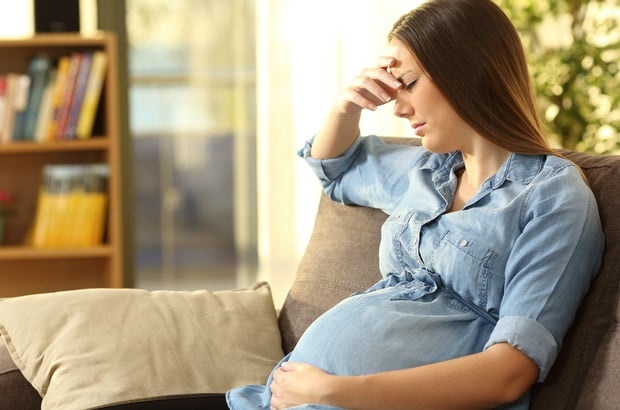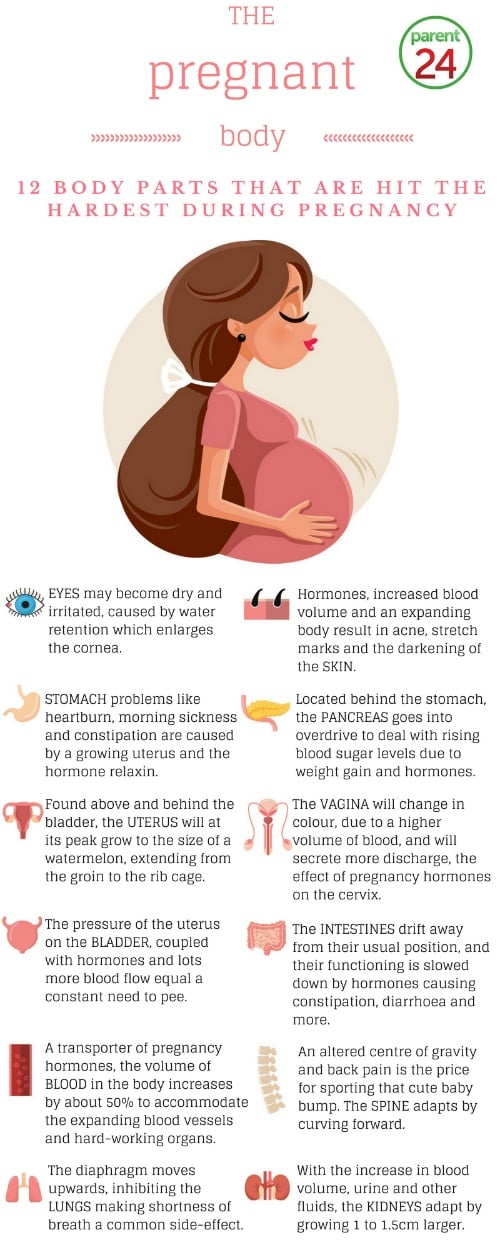
From the very beginning to it's painful yet rewarding end, pregnancy can cause some of the most significant health conditions to a woman's body.
And while we may be more familiar with the less impactful conditions like weight gain and an annoyingly protruding bump, there are much more serious ways pregnancy affects the body.
Here we outline the 12 most hard-working body parts during pregnancy:
What's been the hardest and best thing about being pregnant? Tell us by emailing to chatback@parent24.com and we could publish your letter. Do let us know if you'd like to stay anonymous.
The eyes
For 15% of pregnant women, some kind of disturbance to their vision is part of pregnancy with effects ranging from dry and irritated eyes to flashing lights, blind spots and blurry vision.
The dryness and irritation are caused by water retention resulting in an enlargement of the cornea. However, blurry vision, light sensitivity, and flashes of light may indicate a larger health problem including eye disease, high blood pressure, and pre-eclampsia which can be very dangerous, so do see your doctor.
The skin
Due to the spike in hormones, up to 50% more blood to circulate, and a quickly expanding body, the skin will be visibly impacted during pregnancy. Symptoms to expect include acne, stretch marks, and the darkening of the skin known as melasma or chloasma.
Commonly known as the "mask of pregnancy", melasma or chloasma is the increase of skin pigmentation and causes the cheeks, nose, and chin to darken.
The hormonal changes cause an overall increase in skin pigmentation throughout the body and cause the darkening of other parts of the body as well, including the areola, labia, freckles and moles.
Depending on family history, some women may also develop varicose veins and spider veins.
- Also read: Pregnancy: skin problems
The stomach
Due to a growing uterus, the stomach is displaced and gradually drifts closer to the intestines, moving from a horizontal position to a vertical one.
In addition to the hormone relaxin, which literally relaxes the joints before labour, this displacement slows down digestion. Although only needed later on during labour, relaxin is present early on and is also responsible for food remaining in the stomach for longer than usual.
Heartburn, morning sickness and constipation also occur due to this hormone.
- Also see: Pregnancy week-by-week updates
The pancreas
Prior to pregnancy, the role of the pancreas is to create insulin, a hormone the body needs in order to absorb glucose after food has been digested, and is located behind the stomach, beside the small intestine.
To support pregnancy, the pancreas (like most of the organs in the abdomen) goes into overdrive to deal with rising blood sugar levels largely due to the expected characteristics of a normal pregnancy, that is gaining weight and pregnancy hormones. When the body cannot cope with these changes, blood sugar levels rise, and 9.2% of pregnant women develop gestational diabetes.
The uterus
A baby's home prior to birth, the womb or uterus goes through constant changes throughout pregnancy.
Found above and behind the bladder, at its peak the uterus will grow to the size of a watermelon, extending from the groin to the rib cage. In addition to a baby, the uterus also holds the fluid-filled amniotic sac, which is able to hold up to 800ml of amniotic fluid, and the placenta, a baby's oxygen and nutrients supply and sewage system.
Shortness of breath in the third trimester is partly due to pressure on the diaphragm due to the expanding uterus.
The vagina
Besides the well-known strain the vagina goes through during labour, in addition to a change in colour due to a higher volume of blood, the organ also produces more discharge, the effect of pregnancy hormones on the cervix and the vagina can feel swollen.
The change in colour is known as Chadwick's sign and some women also experience vulvar varicose veins.
Bleeding or spotting is also normal.
The bladder
The ever-present need to visit the loo is something of a pregnancy cliche for a reason. During pregnancy, the uterus hovers over the bladder, but this pressure isn't the only reason for constant toilet visits.
In the beginning, the urge to wee is caused by those pesky pregnancy hormones and the additional amount of blood flow in the body, both functions requiring more activity from the kidneys which subsequently means more visits to the toilet.
In the third trimester, coughing, sneezing and laughing could be enough to cause involuntary urine leakage and is called stress incontinence. Urinary tract infections are also common.
The gastrointestinal tract
Along with the stomach, the gastrointestinal tract also drifts away from its usual position, shifting backwards and laterally in the abdomen.
The hormone progesterone changes the functioning of the gastrointestinal tract, causing the muscles in the organ to slow down considerably. It contributes to all the unpleasant symptoms of pregnancy like haemorrhoids (piles), constipation, nausea, vomiting and diarrhoea.
Some mothers-to-be even develop gallstones since the gallbladder is also slowed down by the progesterone hormone.
Blood
Acting as a transporter for pregnancy hormones, the volume of blood in the body increases to about 50% more in order to accommodate expanding blood vessels, and the additional organ work the body performs throughout pregnancy. High blood pressure, blood clots, and gestational diabetes are possible blood-related symptoms.
An increased heart rate is a normal side effect of pumping all that additional blood, and this may cause heart palpitations and dizziness.
The spine
An altered centre of gravity, mild to extreme back pain and an increased curve in the spine is the price for sporting that cute baby bump. As the baby grows, the spine adapts by curving forward, ensuring moms-to-be don't topple over.
The uterus also puts pressure on the sciatic nerve, the largest nerve in the body which runs from the lower spine all the way down the foot, sometimes causing sciatica, a sharp, shooting pain down your leg.
- Also see: The secret life of your unborn baby
The lungs
The crowded abdomen moves the diaphragm upwards, which inhibits the lungs, making shortness of breath a common side-effect of pregnancy. The hormone relaxin takes the edge off causing the ribcage to enlarge, making extra room for the lungs to expand.
Hormones cause the blood vessels lining the nose, oropharynx, larynx, and trachea to enlarge and may result in upper respiratory tract infections, a stuffy nose, and changes in the voice.
The kidneys
With the increase in blood volume, urine and other fluids, the kidneys adapt by growing 1 to 1.5 centimetres larger. The rate at which blood is filtered in the kidneys increases up to 50%.
High blood pressure, a common symptom of pregnancy, is monitored carefully since the condition can damage the blood vessels locates in the kidneys.
Also frequent during pregnancy, urinary tract infections are also checked as these can lead to kidney infections and even kidney disease.
What's been the hardest and best thing about being pregnant? Tell us by emailing to chatback@parent24.com and we could publish your letter. Do let us know if you'd like to stay anonymous.
Read more:
- 5 top tips for day 1 with your newborn baby
- Sex during pregnancy
- Ten-year-old helps aunt deliver baby after watching videos on YouTube
Sign up for our weekly newsletter to receive Parent24 stories directly to your inbox.




 Publications
Publications
 Partners
Partners















